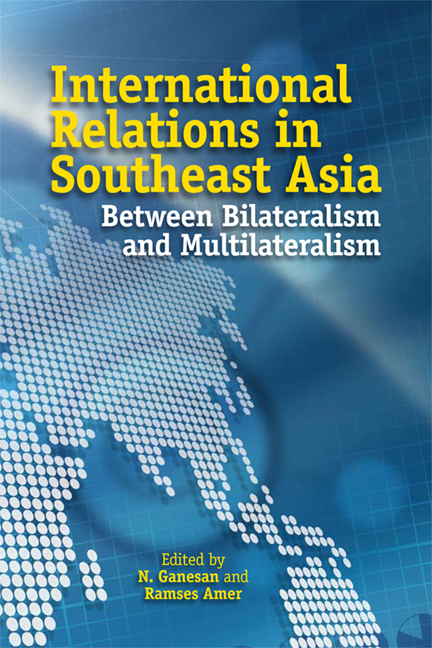Book contents
- Frontmatter
- Contents
- Preface
- List of Abbreviations
- Contributors
- Introduction
- Part I On International Relations
- Part II Case Studies — Mainland Southeast Asia
- 3 Vietnam-Thailand Relations after the Cold War
- 4 Cambodia and Vietnam: A Troubled Relationship
- 5 Thailand-Myanmar Relations: Old Animosity in a New Bilateral Setting
- 6 Thailand-Malaysia Bilateral Relations
- Part III Case Studies — Maritime Southeast Asia
- Conclusion
- Index
6 - Thailand-Malaysia Bilateral Relations
from Part II - Case Studies — Mainland Southeast Asia
Published online by Cambridge University Press: 18 November 2017
- Frontmatter
- Contents
- Preface
- List of Abbreviations
- Contributors
- Introduction
- Part I On International Relations
- Part II Case Studies — Mainland Southeast Asia
- 3 Vietnam-Thailand Relations after the Cold War
- 4 Cambodia and Vietnam: A Troubled Relationship
- 5 Thailand-Myanmar Relations: Old Animosity in a New Bilateral Setting
- 6 Thailand-Malaysia Bilateral Relations
- Part III Case Studies — Maritime Southeast Asia
- Conclusion
- Index
Summary
Thai-Malaysian bilateral relations have undergone some turbulence since the 1990s up until now. Prior to that and especially during the Cold War both countries had broadly convergent foreign and defence policies that were essentially anti-communist and pro-Western. Apart from such broad strategic convergence, both countries had common security threats that necessitated coordinated security cooperation. Such threats included an active communist insurgency, banditry, and transnational criminal activities. At the elite interpersonal level, Malaysia's first Prime Minister, Tunku Abdul Rahman, had Thai ancestry and maintained very cordial relations during his term in office from 1957 to 1969. Reciprocally, Thai elite also treated Malaysia as a special case and maintained friendly bilateral relations. From 1967 onwards, the Association of Southeast Asian Nations (ASEAN) provided similar structural coherence at the broader regional level. After the communist victory at the conclusion of the Second Indochina War in 1975, ASEAN became galvanized to deal with what was perceived as threats to Thai sovereignty and security. Hence, between 1975 and 1988, ASEAN provided structural cohesion and support to the bilateral relationship. However, the fall of the Prem government in Thailand in April 1988 led in turn to a new policy initiative under the Chatichai government that downgraded Vietnam as a source of threat to Thai security.
This new Indochina Initiative disengaged Thailand from previous ASEAN policies toward Vietnam and resulted in closer Thai collaboration with the countries of mainland Southeast Asia. Almost simultaneously, Thailand-Malaysian bilateral relations deteriorated rapidly. Since then and into the post-Cold War period, Thailand-Malaysian bilateral relations have been subject to more turbulence than before. The issues that have led to a deteriorated relationship include an admixture of traditional and nontraditional security concerns. More recently, the ongoing political violence in southern Thailand has been a serious source of bilateral tensions.
This chapter examines Thai-Malaysian relations from a historical and structural perspective.
- Type
- Chapter
- Information
- International Relations in Southeast AsiaBetween Bilateralism and Multilateralism, pp. 143 - 168Publisher: ISEAS–Yusof Ishak InstitutePrint publication year: 2010

